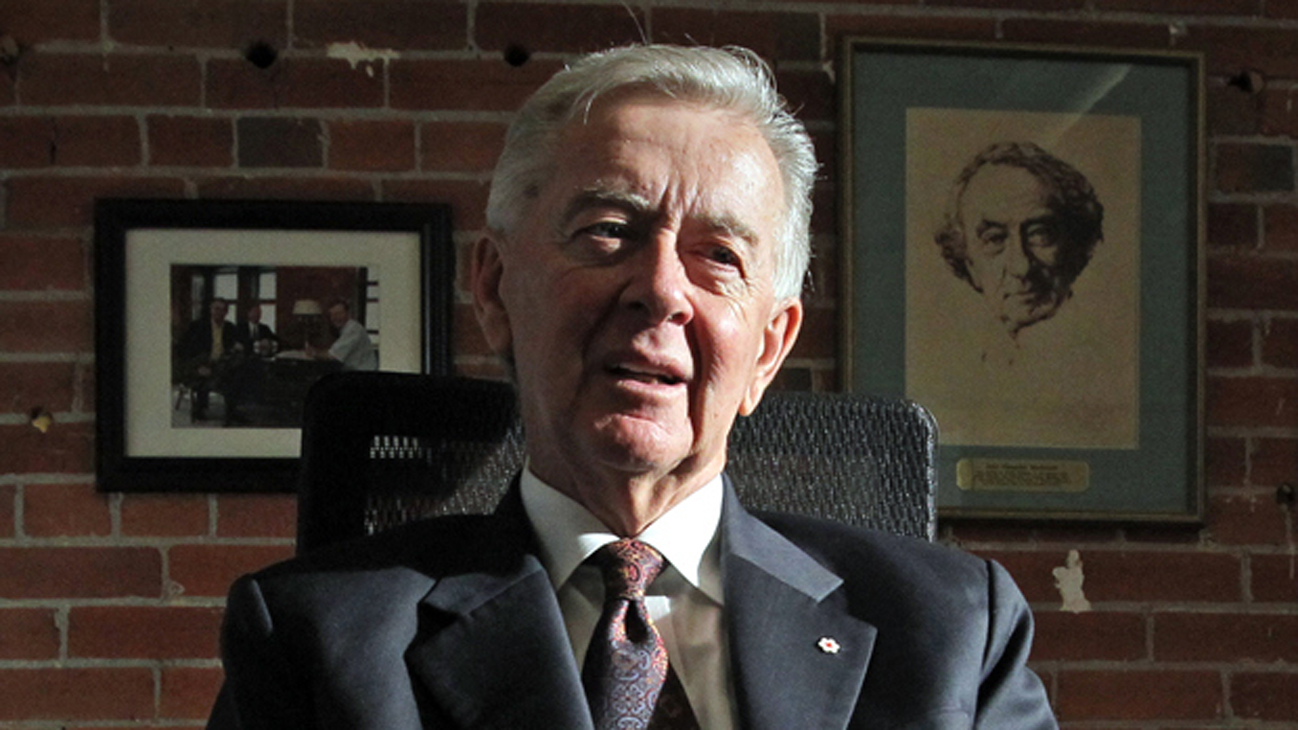It looks like a tech company start-up: brick walls, wooden beams, Scandinavian office furniture, a gourmet coffee machine and new iMacs.
But Reform Party founder Preston Manning hopes it will become a training hub for the next cadre of small-c conservatives who seek to become campaign managers, coordinators, communications staff, policy makers and candidates.
Located in a heritage building in downtown Calgary, the Manning Centre officially opened on Wednesday. It’s a considerable departure from the townhalls, ice rinks and converted churches that were once the staple meeting places of prairie politicians. The centre boasts a lecture hall with plush leather chairs, screens that drop down from the ceilings and a strategy room that allows political trainees to compare poll-by-poll results against a map showing the latest Statistics Canada demographic profiles.
Mr. Manning gave a tour of the building in the afternoon, just hours before a gala reception (huge bottles of Moët could be spotted). Above the doors to the lecture theatre, the former opposition leader pointed to the phrase “Intrate Parati” — from the Roman politician Cicero, who admonished young acolytes that if they were to enter the forum, they should enter prepared.
Mr. Manning spoke to the Post’s Jen Gerson:
Q: Can you tell me about the moment when you realized a centre like this was needed?
A: We started with a new party as opposed to an old party that had resources and connections. I just became more and more conscious, even when we were putting a party together, where do we get the intellectual horsepower? Of course we relied on the think tanks, but we were conscious of our own limited resources. We had a research department of five when we first got to Ottawa. How could we possibly handle the array of issues that come to Parliament or compete with the government? The same with the training, there were all these mistakes that were made, nomination meetings that didn’t get the right candidate, campaign mistakes, elementary stuff but there was no training.
Q: Do you think, from the left’s perspective, that this hub is going to look like a nightmare from a conservative conspiracy theory?
A: Well they can. But I think they would be much more realistic to say that they’ve got the same problems. Their parties can’t generate the intellectual capital they need. They’ve got some of these young candidates from Quebec who hardly knew where Ottawa was, much less what being a legislator was. So they can hardly deny that they don’t need training. I think a far more realistic thing is to say all of the parties need this intellectual capacity, and we hope they’ll bolster theirs.
Q: Is this going to raise the bar?
A: I hope so. A lot of my work on democratic reform has been trying to get structural reforms, changing the Senate process and things like that. I still believe that can be done, but the other way is to raise the skill level of the people who are playing the game. I’ve come to the conclusion that well-trained, well-motivated people can make a bad system work. But people who don’t have those qualities can even make a good system not work.
Q: If there is something that concerns you most about the direction of the Conservative Party right now, what is it?
A: I think they’ve got the basic things right. We do national surveys asking people what’s your number one concern, and overwhelmingly over the last couple of years, it’s been the economy, the economy. Then we ask them to rate the federal government on a whole range of issues and they are given better marks [for the economy] than for anything else. One of the areas where I’ve been working on Conservatives to change is on environmental policy. They don’t have to be defensive; conservation and conservative comes from the same root. But I haven’t been that successful in selling that in Ottawa or in Edmonton.
Q: Why not, do you think?
A: One of the problems in Ottawa is that political strategists tend to conceptualize issues as a sword issue or a shield issue. Sword issues are the ones you’re willing to go out and crusade on because you think you can win. Shield issues are when the other guy has got the stronger ground. Unfortunately for Conservatives, areas of environment and healthcare reform got conceptualized as shield issues. You kind of give up before you start and once they get categorized like that, it’s difficult to change.
Q: Tell me about those two pictures on the wall behind you; John A. Macdonald and, is that Louis Riel?
A: Yes. Some people say he was the first western reformer. This picture shows Dominion land surveyors who were coming across the land. The surveyors kept a record in their journal and [Louis Riel] put his foot on their chain and said: “This is our land.” This was the first confrontation between the federal government and the west. And guess what it was over? Resources. Nothing new under the sun.
This interview has been edited and condensed.
From The National Post
By Jen Gerson

